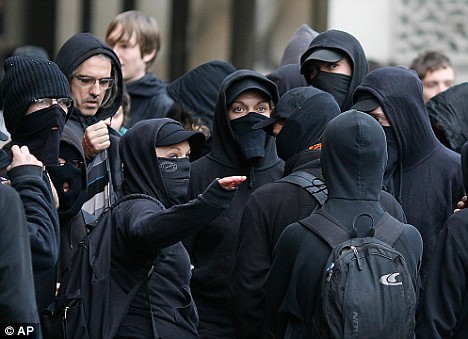
Almost as quickly as the Occupy Unmasked film was released, Andrew Breitbart’s expose on the Occupy Wall Street movement, liberal critics began to attack the film’s honesty. Many claimed the film was inaccurate for portraying the movement as revolutionary in nature and prone to violence. Code Pink’s Medea Benjamin attended an advanced screening of the film and denounced it as “dishonest” for portraying the movement and its leaders as violent or driven by anything other than bettering the lives of Americans.
The mainstream media support of the Occupiers, Barack Obama’s “sympathizing with their frustration,” and Nancy Pelosi’s “applauding them for their spontaneity,” was a difficult time for those of us actually covering the movement. We saw it for what it was; a revolutionary effort to overthrow the US Constitutional government and shatter our economic system. We knew the “peaceful” portrayal offered by mainstream outlets didn’t jive with a movement we knew supported the use of violence.
Late September brought a breakthrough as the CUNY Grad school hosted a panel of Occupy leaders and strategists. The panel, appropriately named “Occupy Tactics: Violence and Legitimacy in the Occupy Movement and Beyond,” featured some of Occupy’s foremost strategists identifying themselves with global and foreign revolutionary movements. The primary focus of the panel was the debate between “a diversity of tactics” vs non-violence. Perhaps the most telling aspect of the discussion was that all speakers believed in the justification of the use of violence. The debate was not about the morality of violence; it was about whether violence was an appropriate revolutionary tool at this particular time in the movement.
The CUNY Grad school panel was organized by Andy Stepanian, an activist convicted of domestic terrorism for his participation in radical far Left campaigns to stop animal lab testing by terrorizing shareholders of an animal testing company. Stepanian founded and runs The Sparrow Media Project and also contributes to the Huffington Post.
The panel was moderated by CUNY Associate Professor of Sociology Sujatha Fernandez. Fernandez covers political revolutions and “uprisings” for the New York Times.
The two notable panelists were Brian Travin, a Black Bloc advocate and self-described revolutionary, and Chris Hedges, a writer and journalist who covers revolutions and war, and who also participates in strategizing for Occupy.
Here are a few of their quotes from the panel:
“I’m not here to argue for violence, I’m here to argue for a more nuanced analysis of a more nuanced analysis of the use of force than the violence/non-violence dichotomy….”
Brian Travin
“Perhaps the Black Bloc is also singled out as a bugaboo, to scare us away from tactics that perhaps we need to be able to advance the social movements that we want to participate in.”Brian Travin
“I certainly support the diversity of tactics.”
Chris Hedges
“I’ve covered revolutions, insurrections, most of the revolutions in Western Europe, five years in El Salvador, two Palestinian Uprisings, I was in Sarajevo during the war… I’m not a pacificst, I understand that there are moments in human history when armed forces wish to destroy you…”
Chris Hedges
“Occupy itself, was a tactic. And I don’t buy this argument that Occupy is dead. Occupy is not dead. Look at the streets of Chicago. It may not be called “Occupy,” but if you’ve been following [the teachers union strike], the most important strike in recent memory, when those teachers go into the police stations…the police will applaud.
And that terrifies the corporate state. Because in every revolution that I cover, when the pillars or the foot soldiers of control can no longer be counted upon to defend a corrupt, fragile, ruling elite, then that elite is in danger.”
Chris Hedges

COMMENTS
Please let us know if you're having issues with commenting.